The Knitting Circle Read online
Page 6
“Oh,” Mary said, and it sounded more like a moan than a word. Her heart seized in on itself as she thought of this other lost child, and she said, again, “Oh.”
“We never discussed what happened next,” Scarlet said. “I simply came back to the States, alone. He blames me, of course. Why shouldn’t he? I’m guilty. I didn’t watch his daughter and she died. I can never make that right. The guilt used to keep me up at night. It used to drive me crazy. I would try to rewrite that day, that morning. In this version, I would make myself stay awake. We would build sand castles, Bébé and I, with elaborate turrets and moats filled with seawater. And Claude would come back to the beach with our lunch, and we would eat it together, all four of us. And we would swim in the ocean and grow brown under the hot sun. And we would fill our bucket with shells and sea glass. And we would live happily ever after.
“But, of course, then morning would come and I would be left with the real story and the awful true ending.”
The day had turned to dusk. Outside Scarlet’s wall of windows the sky was slashed with violet and lavender. Mary had dropped a stitch early on, and a run of emptiness climbed up the center, cutting through the happy wool like a scar.
“I know about your daughter,” Scarlet said. “I remember reading it in the paper. Meningitis, right?’
“Yes.”
“We have this in common,” she said softly.
There was a small silence. Then Mary said, “Her name was Stella.”
Neither of them was knitting anymore.
“I’ll show you,” Mary said, her voice shaky.
She opened the bag at her feet and from it took the picture of Stella she carried everywhere with her. It wasn’t the most recent photo, or even the most beautiful. It was just the one that looked the most like Stella, her head cocked, smiling broadly, her eyes bright beneath her tangled hair.
Scarlet’s breath caught.
“Yes,” she said finally. “Lovely.”
They sat side by side, and watched the sky grow dark.
4
THE KNITTING CIRCLE
FOR SEVERAL WEEKS Mary did not go to the knitting circle. A kind of inertia took hold of her, and even though when Wednesday night neared, she thought of going, she could not get herself there. She admired Scarlet, who, after losing Bébé, after losing everything, had managed to make something of her life again. Rouge—and how that name took on such significance now, Mary realized—was always crowded. Why, Mary had written a rave review of it when it first opened, marveling at the butteriness of the croissants, the intensity of the hot chocolate. She wanted to find inspiration in Scarlet’s story, but her still-new grief kept her paralyzed.
Alone in the late afternoons, Mary tried not to think about how six short months ago she would be picking up Stella at school, watching her run down the front steps with her impossibly oversized backpack, her collection of key chains jingling. She would be swooping her daughter into her waiting arms. Trying not to think of these things, Mary picked up her needles and knit. Scarves unfolded in her lap—fat ones; textured ones; eyelash scarves made of thin strands of yarns knitted together—one glittery and multicolored and one soft and fluttery.
On warm autumn days like these, she and Stella would go to the playground on the corner. Or they would walk to the small library up the street and fall into the plump cushions in the children’s section and read. Mary remembered these things as evening approached. She remembered them, and she knit.
ON ONE OF these afternoons the phone rang and Mary answered it. Often she didn’t. She let the machine pick up and listened as friends checked in on her, offering cups of tea, afternoon movies, martinis. But on this afternoon she answered because outside her window she could clearly see her neighbor Louise, and Louise’s three children, placing their just-made jack-o’-lanterns on their front stoop. The excited giggles from those kids made Mary want to run across the street and smash those goofy carved pumpkins. Even worse: Halloween was two days away.
“It’s Scarlet,” the voice on the other end of the phone said. “I thought you might want me to pick you up tonight.”
“Knitting,” Mary said.
“Six o’clock?”
Beautiful-colored leaves floated down from the tree in Mary’s yard. She watched them lift, hover, fall.
“Sometimes,” Scarlet said, “you need to get out of the house. Out of your brain.”
Mary thought of that day at Scarlet’s, of Scarlet’s story about Claude and Bébé.
“Okay,” Mary said. “See you at six.”
Dragging a comb through her tangled hair, Mary imagined sharing her own story with Scarlet. She would tell her about Dylan, and how they had found each other late in their lives; how Stella had been their one chance to make a family. Perhaps she could tell Scarlet what kind of father Dylan had been, how he liked taking Stella grocery shopping, just the two of them. He would bring a lemon to her nose and have her inhale its scent. He taught her how to tell when a melon was ripe, how to choose an avocado, how to order meat from the butcher. After Stella died, Mary took over the grocery shopping, wandering the aisles alone. The sight of a father there with his little girl safely strapped into the cart, nibbling on blueberries or crackers broke her heart. Somehow Mary believed that maybe Scarlet would understand what she and Dylan had lost.
When she thought of her, of Scarlet, she saw her in the south of France, happy. That happiness had lasted only a moment, Mary knew. It seemed to her she’d had Stella for only a moment.
Staring at the stranger in the mirror, Mary sighed. Her face was rounder, her hair duller, her eyes flat. It was another person who used to like what she saw when she looked in a mirror, who playfully added mascara to her lashes and sparkly blush to her cheeks. Mary dug around in her cosmetics bag until she found the hot pink tube of mascara inside. But it had caked from lack of use, and she couldn’t find her blush at all. Who was she kidding? she thought. She looked bad, she felt bad, and she was not ready to talk about any of this to anyone. She had paid a grief counselor a hundred dollars a week for almost two months and all Mary did was sit and cry, which was what she did at home for free.
Mary scrawled a note to Dylan, Gone knittin’, and left it on the kitchen table. At ten after six, Scarlet pulled up in front of Mary’s house. A new friend, Mary thought as she carefully locked the front door. Just that day Jodie had finally called and said, “I don’t know what to say. Should I ask how you are? Should I mention Stella or not? God, Mary, I am so sorry to let you down.” And Mary had said, “No, no, I’m fine. Really.” The lie had burned in her throat for the rest of the afternoon.
Eddie had called and Mary had lied to him too. “You know,” she’d said, “I’m doing so much better. Really I am. Maybe I’m ready to come back to work.” “Uh-huh,” Eddie had said, knowing better.
As she approached Scarlet’s car, she saw that someone else was already in the front seat beside Scarlet.
“You remember Lulu?” Scarlet said after Mary slid into the backseat.
“Of course,” Mary said, trying to hide her disappointment.
Lulu’s platinum blonde hair was newly razor cut in uneven chunks, shiny from some expensive hair care product like wax or mud that kept it looking slightly dirty. She had on black again: a leather motorcycle jacket, turtleneck, skinny pants, and boots.
Mary settled back into the seat, wishing she hadn’t come.
“Lulu’s loft is right beneath mine,” Scarlet said. “She’s a glass sculptor.”
“Really?” Mary said.
“You moved here from where?” Lulu said. Her voice sounded like she’d been smoking and drinking whiskey her entire life.
“San Francisco,” Mary said.
“Have you noticed,” Lulu said, turning slightly, “that everyone in this city is from somewhere else?”
Despite herself, Mary relaxed. Lulu wasn’t so bad. It was Mary herself who couldn’t relate to anyone.
“A glass sculptor,” Mary said. “Tha
t seems so…I don’t know, to work with such a fragile material seems impossible.”
“The beauty of glass,” Lulu said almost dreamily, “is that it’s remained unchanged for hundreds of years.”
“She trained in Venice,” Scarlet said.
“Maybe you’ll show me your things sometime,” Mary said.
“Maybe,” Lulu said unconvincingly, looking straight ahead.
“WAIT!” BETH SAID. “I brought pictures.”
She pulled a set of glossy photographs from a large envelope. Four children—two boys standing behind two girls—smiled stiffly out from them, all wearing matching red and green sweaters. Did she get her kids’ picture taken every fucking week? Mary thought.
“Have you ever seen such perfect children?” Harriet said softly.
Yes, Mary thought. Yes, I have.
Mary hated the way Harriet looked at Beth, as if she were the only person who’d ever had children. She watched Harriet watching Beth’s proud face. No, Mary decided, she looks at her as if she might disappear.
Scarlet glanced at the picture politely, then passed it on to Lulu. “Nice,” Scarlet said without much conviction.
“What a brood!” Lulu said.
Beth laughed. “I always wanted a lot of children.”
“She graduated magna cum laude, you know,” Harriet said.
Beth shrugged off the boasting. “In early childhood education. It wasn’t too challenging. It was just what I loved.”
“She loves kids,” Harriet said, her voice so tender that Beth flushed with embarrassment. “Of course, I worry about her,” Harriet added. “She does too much.”
Mary rolled her eyes and lost track of what she was doing.
“Did I just knit?” she said. “Or purl?”
Scarlet leaned over to help and locked her eyes with Mary’s. She wants to take that picture and tear it to shreds too, Mary thought.
“The knit stitches look like little Vs,” Scarlet said. “See? And the purls look like bumps.”
“Like pearls,” Harriet said.
“So I just purled?” Mary said.
Scarlet grinned. “No, you just knit.”
Mary settled back and concentrated. Purl two. Knit two. Beth’s voice swirled around her. Purl two. Knit two.
“Chris is my comedian. And Nate is my athlete. He plays three sports…”
Purl two. Knit two. Purl two.
“…Caroline is the scholar. She always has her nose in a book. I don’t know where she got that…”
Knit two. Purl two.
“…And what can I say? Stella’s my baby. We named her after my grandmother, you know, and believe me, she’s the only Stella in her nursery school.”
Mary stared at the yarn in her hands and gulped. It looked unfamiliar suddenly, and she wasn’t even sure what she should be doing with it.
“If I could only keep her four forever,” Beth said with a sigh.
Scarlet kneeled in front of Mary. “Do you need help?” she said softly.
“I, I don’t know what I’m doing here,” Mary said.
“You just purled two stitches,” Scarlet said, her voice calm and even. “Now you’re going to knit two stitches. Then purl two.” She didn’t move until Mary finally knit two stitches.
“Now knit two,” Scarlet said softly. “Now purl two. Now knit.”
“COME WITH US for martinis,” Scarlet said as they drove back to Providence.
Exhausted, Mary said, “Maybe another time. I didn’t even tell my husband I was going out.”
“See?” Lulu said. “Husbands are a grand liability, Scarlet. They keep you away from martinis.” Lulu pointed out the window. “Look!”
The moon hung full and orange in the sky ahead.
“Blue moon,” Lulu crooned.
“Looks red to me,” Scarlet said.
“No, no,” Lulu laughed. “A blue moon is the second full moon in the same month.”
“Lulu knows more fun facts than anybody I know,” Scarlet said.
“Correction. More useless facts,” Lulu said, her gaze focused out the window.
Two hundred and twenty-eight thousand children and young adults die every year. Sixty thousand children a year under the age of six die. Two thousand children a year die from bacterial meningitis. The children who live often lose limbs or hearing or eyesight.
“You know,” Mary said, her voice quivering, “a martini sounds like a great idea.”
THE BAR WAS downtown, on a block of deserted buildings, tucked away without a sign or awning. Inside, it was crowded and smoky and the three women had to stand crushed close together at the bar.
Two oversized martinis later, a small table opened and Lulu pushed her way to claim it. Mary was starting to like Lulu. She reminded Mary of her old self, the one who had something to say about everything.
Sitting with a fresh round of drinks in front of them, Mary said to Lulu, “I can’t believe you ever left the city. It seems like a perfect fit for you.”
Lulu fished an olive out of her drink and popped it in her mouth. She ordered her martinis dirty, extra olives and their juice.
Mary frowned, wondering what she had said wrong.
“Beth can be a bit much,” Scarlet said, breaking the awkward silence. “The matching sweaters. The pictures.”
“Always with the fucking pictures,” Lulu said.
Mary’s stomach tumbled, remembering Beth’s voice. What can I say? Stella’s my baby…
“Mary?” Scarlet was saying, her hand resting tenderly on Mary’s arm. “Are you all right?”
“I should get home,” Mary managed.
“Sadie, Sadie, married lady,” Lulu said.
Later, standing in her bedroom doorway, dizzy and melancholy, Mary studied her husband’s sleeping face. It had become topographical from grief. Even in sleep he wore his sadness plainly. CNN blared from the television, talk of wars and distant tragedies. Mary walked over to the television and turned it off, sending the room into darkness except for the blue moon that lit up the sky.
Part Three
KNIT TWO TOGETHER (K2 to g)
Patterns are more specific about decreasing than increasing. Decreases done in certain ways slant the stitches to the right or left. For many patterns this is an important element; for others it doesn’t matter at all that much.
—NANCY J. THOMAS AND ILANA RABINOWITZ,
A Passion for Knitting
5
LULU
ON HALLOWEEN NIGHT, Mary stayed in bed and watched TV. Even as the doorbell rang and children’s voices chirped, “Trick or treat!” to Dylan, Mary stared at the television.
Downstairs, Dylan marveled at miniature Spider-Men and Harry Potters. He claimed each witch the scariest, each princess the loveliest. Mary did not think of the way that Stella always chose a winged creature for her Halloween costume: butterfly, bumblebee, fairy. She did not think of how meager that list was, how it should have grown over the years, adding bats and ladybugs, raptors and dragonflies.
Eventually Dylan came upstairs.
“What a crowd!” he said. “We never have such a crowd.”
“Usually we’re among them,” Mary said without looking at him. “We’re trick-or-treaters.”
He stood in front of the television, holding a pastry box tied with string.
“Someone got mixed up and gave us candy instead of the other way around?” she said, taking it from him.
She pulled the string from the box and opened it. Inside, nestled in a tight row, sat three cannelles.
“Scarlet brought them?” Mary said.
“I found them on the doorstep. No note.”
Dylan sat beside her on the bed.
“What a terrible night,” he said.
Mary handed him one of the pastries and took one for herself, letting its perfect sweetness fill her mouth.
“It might have been better if we’d done it together,” he said, not looking at her. “If we’d both been down there.”
&nbs
p; Mary shook her head. “I told you I couldn’t,” she said. “You could have hidden up here with me.” She tried not to sound defensive.
But Dylan said, “I guess I can’t hide from everything like you can,” and she heard that too-familiar edge in his voice.
“I’m sorry,” Mary told him, though she wasn’t certain what she was sorry about: sorry that Stella had died and she couldn’t handle it? Sorry she couldn’t be more like him in the face of this?
“I’ll fight you for the third one,” Dylan said, changing the subject, letting their frustration lie there between them.
“One holiday down, and an infinite number to go,” Dylan said, licking crumbs from his fingers.
“And my mother’s threatening to come for Thanksgiving,” Mary said, her hands shaping the string into the Eiffel Tower.
Too early one morning her mother had called. “I’ve been invited to eat with Saul and his family,” she’d said, “but if you want me there, there I’ll be.”
“Saul?” Mary had said, cranky. She hated starting the day with a phone call from her mother. “Who’s Saul?”
“I’ve only mentioned him a few hundred times,” her mother said. “A neighbor. A friend. His children, all three of them, come down from Houston for Thanksgiving. With their spouses. And their children.”
“Lucky Saul,” Mary said.
“Eight grandchildren. He’ll have a full house, that’s for sure. I said I’d make my sweet potatoes. The ones I do so beautifully? The casserole? And of course help with the turkey.”
“It sounds like you should stay there then,” Mary said. Her first year without Stella, and didn’t all the books and groups and advice about grief warn that all the firsts were the worst? Couldn’t her mother figure that out when everyone else seemed to know it?
“That’s what I thought,” her mother was saying. “You and Dylan should get away. Go to Havana. That’s the place to forget everything.”
“What if I don’t want to forget?” Mary said, closing her eyes against her mother’s voice, against the sun that was beginning to show its bright face in her bedroom window, against the whole world beyond her bed.

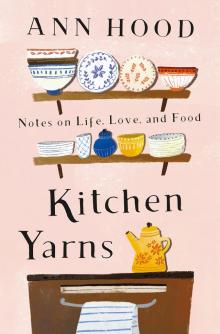 Kitchen Yarns
Kitchen Yarns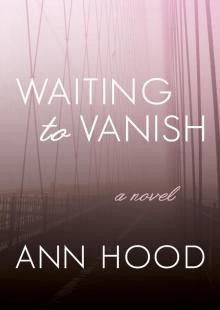 Waiting to Vanish
Waiting to Vanish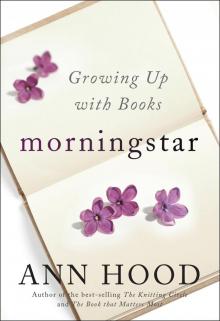 Morningstar
Morningstar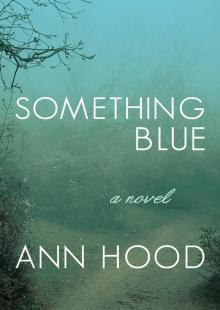 Something Blue
Something Blue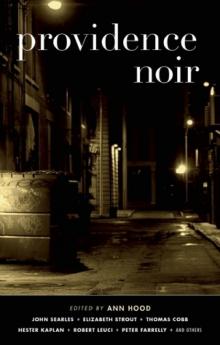 Providence Noir
Providence Noir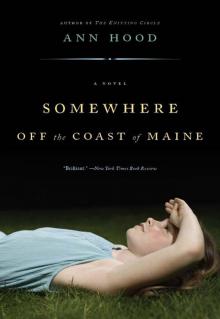 Somewhere Off the Coast of Maine
Somewhere Off the Coast of Maine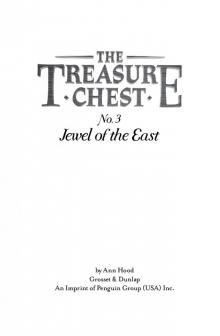 Jewel of the East
Jewel of the East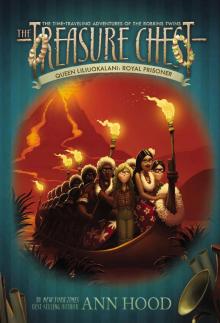 Queen Liliuokalani: Royal Prisoner
Queen Liliuokalani: Royal Prisoner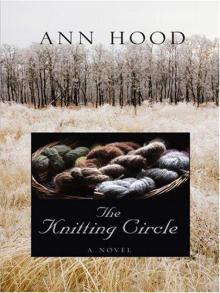 The Knitting Circle
The Knitting Circle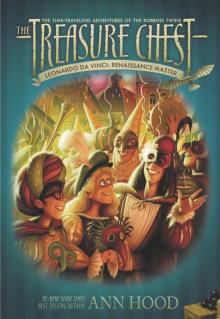 Leonardo da Vinci: Renaissance Master
Leonardo da Vinci: Renaissance Master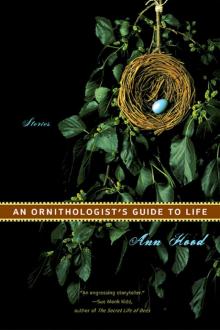 An Ornithologist's Guide to Life
An Ornithologist's Guide to Life The Red Thread
The Red Thread She Loves You (Yeah, Yeah, Yeah)
She Loves You (Yeah, Yeah, Yeah)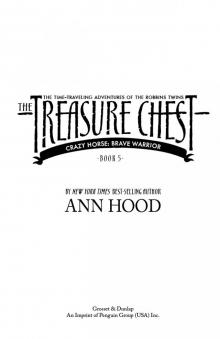 Brave Warrior
Brave Warrior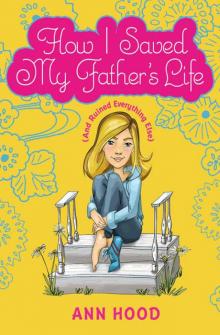 How I Saved My Father's Life (and Ruined Everything Else)
How I Saved My Father's Life (and Ruined Everything Else)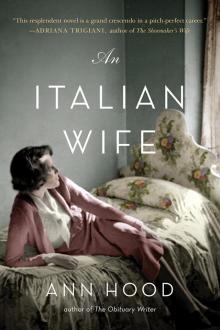 An Italian Wife
An Italian Wife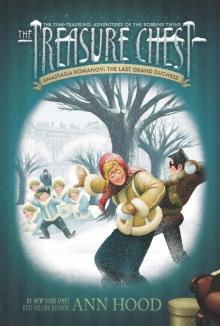 Anastasia Romanov: The Last Grand Duchess #10
Anastasia Romanov: The Last Grand Duchess #10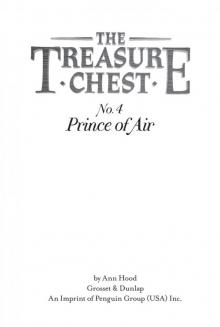 Prince of Air
Prince of Air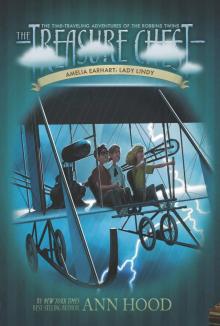 Amelia Earhart: Lady Lindy
Amelia Earhart: Lady Lindy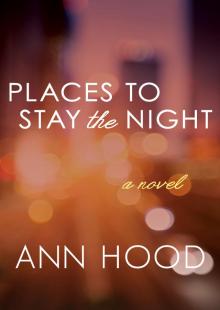 Places to Stay the Night
Places to Stay the Night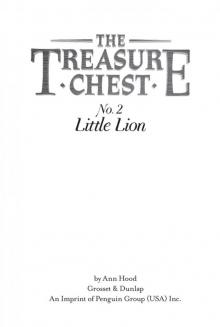 Little Lion
Little Lion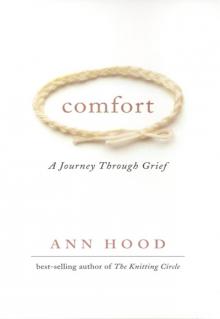 Comfort
Comfort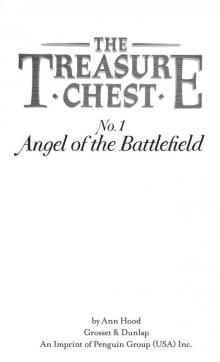 Angel of the Battlefield
Angel of the Battlefield